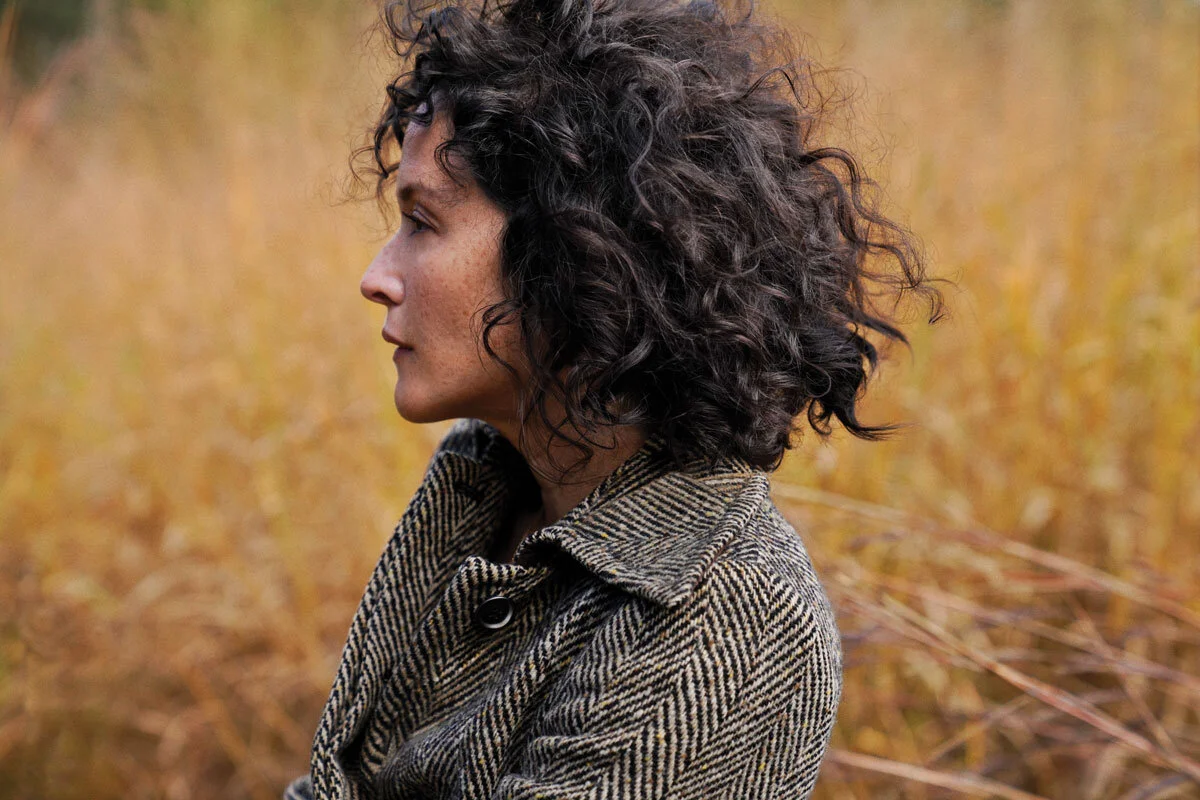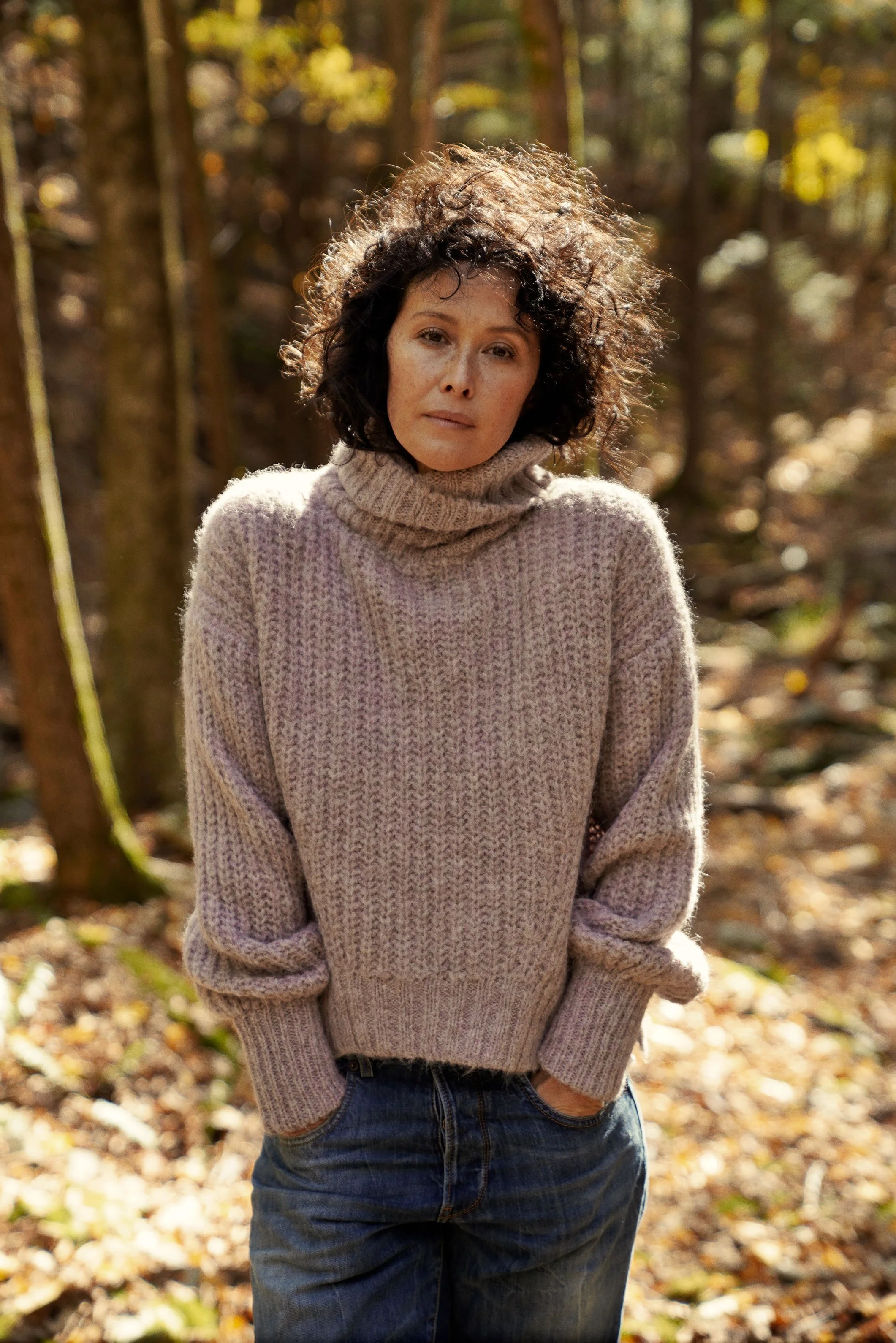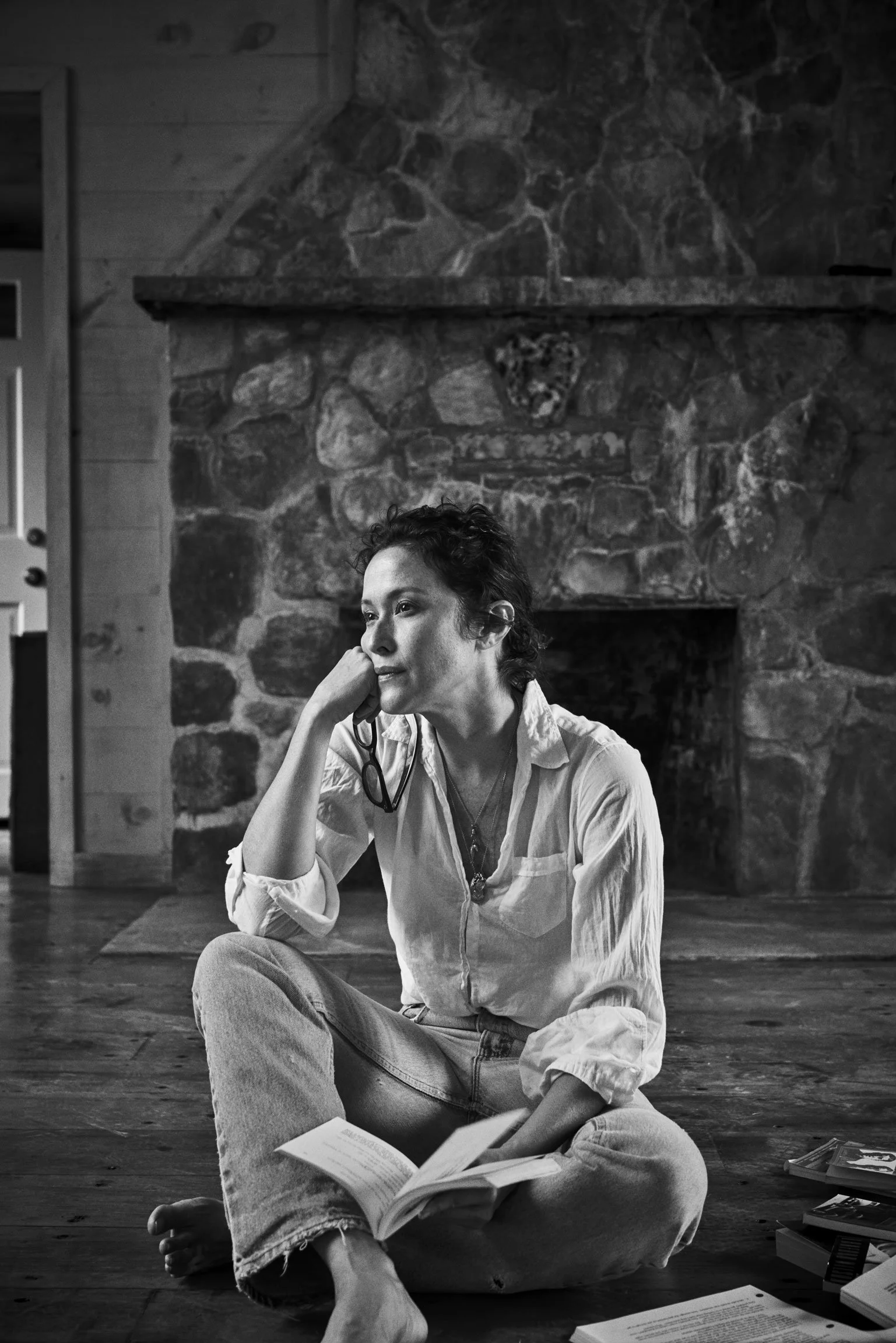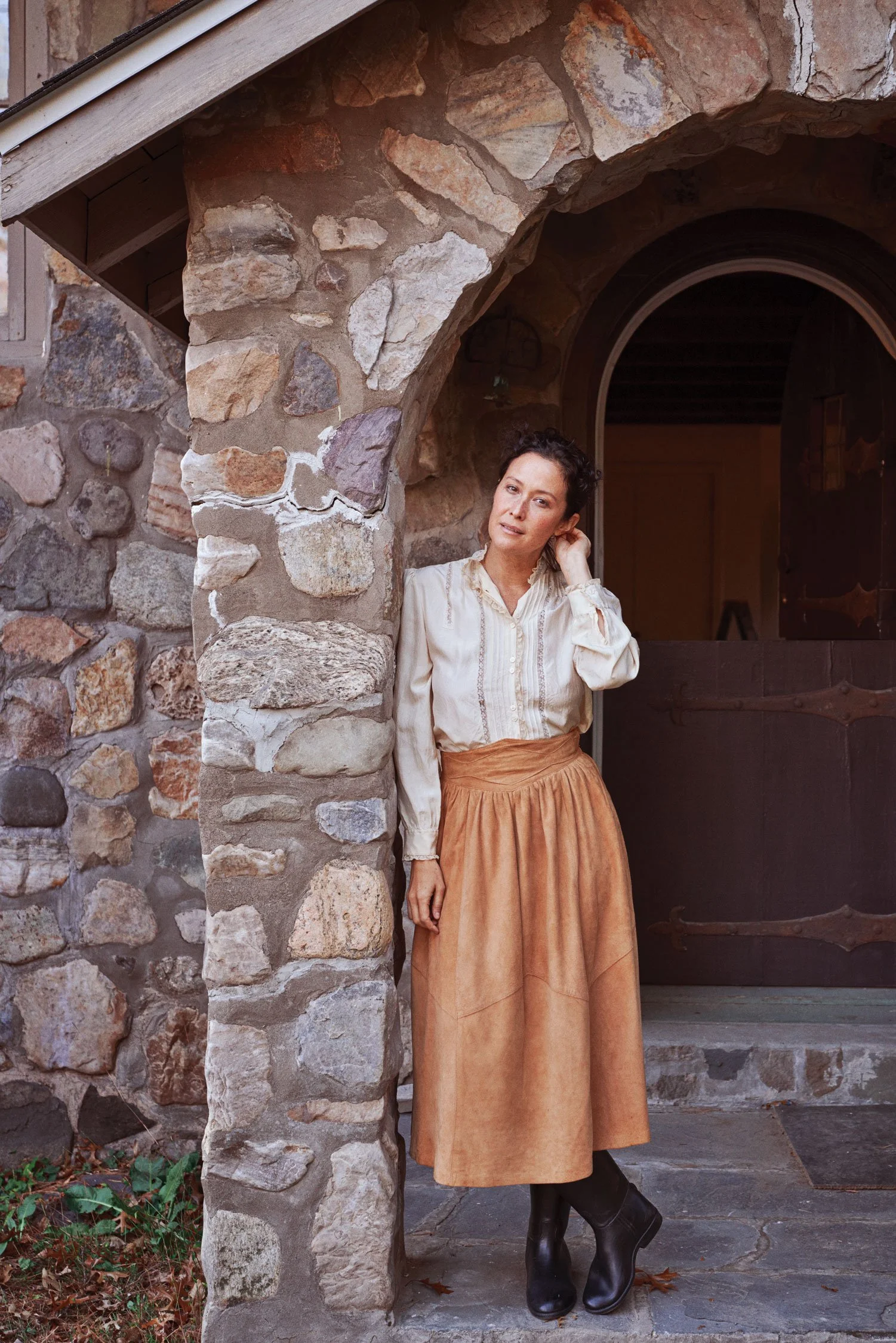Natane Boudreau is not just meditating on a mountain
Words JANET MERCEL
Photography CARTER SMITH
Fashion Direction LAURA FERRARA
Art Direction JOHN PAUL TRAN
Hair DJ QUINTERO
Beauty VIRGINIA YOUNG
The supermodel, actor, film producer and native New Yorker has been a fashion industry darling virtually since birth. Leaving Greenwich Village behind for a full time life in Woodstock, NY, she tells us about challenging mainstream ideas and her Pursuit of Consciousness.
If only there was some curated portal where you could look up Classic New Yorkers, the image of supermodel Natane Boudreau would be there. Although she’s only in her mid forties, it seems she has always been there, as a child model cast in Calvin Klein campaigns shot by Bruce Weber. As an already-seasoned teenager walking in her first ck show alongside Kate Moss, or on the club circuit from the Hamptons to the Meatpacking District. If you were in New York in the early 2000’s, or opened a fashion magazine anytime around then, you saw Boudreau’s face.
She was brought up in Manhattan by her mother, Nian Fish, one of the most influential Creative Directors and fashion producers in the industry. Weekends were spent with her father, a ballet dancer who gave private instruction in his studio to Al Pacino and Bill Murray, and taught her horseback riding and how to do one-handed pushups. On her mother’s side, she is Japanese, Chinese, Welsh and German. Her father is French, English and Cherokee. Her whole career, she was sent up for the “ethnically ambiguous” parts in television and film, and it’s true- she is difficult to place. Although these days, her cloud of curly black hair runs wild in a way that would make Heathcliff go chasing her around The Grange at any moment.
Fish immersed her daughter in the world of sartorial showmanship from birth, and they are recognizable figures in a city that lives and breathes their wheelhouse. I’d met Boudreau once myself a couple of summers ago in a Woody Allen-esque meet-cute outside Bar Pitti in Greenwich Village. (Speaking of Allen, see “Radio Days” for an early appearance from a seven-year old Boudreau.)
I walked into the restaurant with my partner, another Classic New Yorker, who didn’t let the fact he was carrying three plastic-wrapped shirts fresh from the dry cleaner stop him from saying hello to Boudreau and her mother at one table, and a few model agents he’d known for about 20 years at another. “You just picked up your laundry and brought it to dinner,” someone squealed delightedly. ”That is so old school.” A perfect Metropolitan Life moment, all the more so for Boudreau being there.
When we spoke again for this story, her voice lit up through the phone.“I remember! We talked about the film I’d just produced.” She didn’t have to remember that night, or me, but she had, and didn’t pretend otherwise. There is a sweetness to her, and a humanity that belies a youth spent modeling for Richard Avedon and Steven Meisel, for Dolce & Gabbana, Karl Lagerfeld, Tom Ford, Marc Jacobs, and pretty much everyone else. She seems light years away from the precocious teenager partying at The Roxy.
Boudreau has just sold her jewel box apartment on W. 9th Street, (the listing was written up in The New York Post) to relocate full-time to Woodstock, NY. She’s had a presence upstate her whole life, (“my mom was a hippie, she came here in the sixties”), but she’s been gravitating more and more in the last couple of years to the house they share until she felt ready to make the full exodus.
“I’m very complete with my time in New York,” Boudreau says. “Anyone who’s looking for ‘something else’, they go to California, to Sedona, or Upstate New York. I didn’t care about coming here when I was a kid. All the cute boys were in the Hamptons! And as an adult, I never thought I would move. But to survive there...you have five jobs and you’re eating your brown rice and avocado roll in the taxi. You’re in a meeting as you’re walking down the street. Here, I’m making space. It doesn’t hurt as much upstate.”
“It” could mean any number of things. These are tumultuous times. Like everyone else, Boudreau is seeking solace. She and her mother partner on many projects; their production company, N + N Films, makes fashion shorts for clients such as the CFDA Fashion Awards, Riccardo Tischy for Givenchy and Vera Wang. “We write, produce, direct. Currently we’re completing five fashion shorts and an art film for the Metropolitan Opera. We do everything together.”
During the long months of quarantine, headquartering their company upstate made sense to Boudreau, as it now does to prepare for the long haul. “I bought my own gorgeous, stone house I’m renovating, built in 1925,” she says. “I get my antiques on Warren Street in Hudson. My 1940’s Italian Carrera round dining table has all twelve astrological star signs in gilded gold, I found it at Regan & Smith. Gardening is new to us in the last few months, but we wanted to be self-sustainable. I felt fraudulent trying to function in the city, but I’m not just up here meditating on a mountain.”
“I never thought I would move. But to survive there...you have five jobs and you’re eating your brown rice and avocado roll in the taxi. Here, I’m making space. It doesn’t hurt as much upstate.”
She means literally. Boudreau is a longtime practitioner of Transcendental Meditation (TM), and deeply devoted to the teachings of the The David Lynch Foundation for Consciousness-Based Education and World Peace, one of the foremost global promoters of TM. “I was going through a bad breakup a decade ago,” she recalls. “I was in a lot of pain, a lot of emotional turmoil. The day I learned TM, it was as if I took a magic pill. I’ve never missed a day of meditation in 10 years. I cannot live without it.”
“Growing up as a model in the 90's, there was a silent agreement that models could have no self-expression around their needs, emotional or physical. “Over the years, more and more, I felt that my identity, self-worth, point-of-view, and feelings had no right to exist and it was deeply painful. I was shooting for a big magazine in Madagascar and my job was to swim in the water next to an active, hot volcano. I asked the photographer if he knew for sure it was safe. I got a call from my agent the next morning saying I’d been fired. Having just flown into Africa, I was being told to go right back to New York for asking a safety question. Basically they were saying, ‘you're getting so much money and paid to look glamorous, so be quiet.’”
It’s a familiar story in the industry, and one Boudreau remembers as a typical day, to a lesser or greater degree. “At 24, I had enough of that internal and external conversation, and I immersed myself in powerful transformational workshops and acting schools.” She used her personal experience and dramatic training from the Royal Academy of Dramatic Arts and The William Esper Studio to create Natane’s Lab, a full curriculum of immersive master classes and private coaching: The Mastery of Self Expression and Empowerment, The Acting Experience, and The Tools of the Trade. “My clients move from a place of unconsciousness to consciousness, from fogginess to clarity. The workshops are focused on unearthing one’s purpose and aligning actions with goals.”
If the program sounds intense, that’s because it is.
The pursuit of Truth, Transparency, and Consciousness are the foundation of Boudreau’s life, the tenets that drive her belief system. I also studied drama in school, and left because I found the mandate of raw vulnerability and an entirely open mind too overwhelming. It is this very quality that draws Boudreau. As she put it, “I wake up everyday with a burning desire to plant seeds of consciousness in myself and others. I stand to uncover one's disempowering narratives so that the individual can live their life's true meaning and purpose.”
It’s a mouthful, and one that, while discussing her ideals, made me itchy. While I unequivocally support teaching young women compassion for themselves and others, and the right to self expression, in our current zeitgeist, the line between an understanding of basic human rights and radically polarizing world views can become hopelessly blurred. When I think of human rights, the last thing that occurs to me is “medical freedom” as it stands in the New World. For Boudreau, however, absolute physical autonomy is paramount.
“Over the years, more and more, I felt that my identity, self-worth, point-of-view, and feelings had no right to exist and it was deeply painful.”
“People thought I got jobs from my mother, but for me it was a block. She could make a model’s career by promoting her to top designers, but obviously she couldn’t promote her own daughter, even if I was right for the job.
Her views are solidly in alignment with Robert F. Kennedy, Jr.’s stance on vaccinations, including a pervasive fear of the 5G network rollout and Bill and Melinda Gates. I am relieved when she does not expect me to agree, nor does she try to convince me to, a refreshing break from the dogmatism that can sweep the fashion milieu when embracing a concept.
“I know plenty of green juice drinking, acid dropping hippies up here that are all voting for the current president because he is dismantling the system of forced medicine. It’s in support of total body sovereignty.” Boudreau herself, is a staunch Independent; her faith still lies with her “main man,” Bernie Sanders. “I still have a doll of him on my desk,” she tells me, smiling. “I’m not a Trump supporter, but I can’t stand politics. In my house growing up, and with my grandparents, there was no shaming. Our love for each other was beyond politics.”
Boudreau is comfortable as an indefinable outlier. She attended progressive primary schools in New York City where families weren’t identified by race, while her mother’s mother worked as a manager at a Chinatown sweatshop. In the 1930’s their family owned Chinese restaurants in Kobe, Japan, but her grandmother experienced horrific racial prejudice in the 1950’s for marrying a white American soldier.
“I didn’t understand why there would be loads of Japanese fans waiting for my autograph outside the shows in Paris, Milan and New York,” she explained. “I was a “supermodel” to them because I was Eurasian. It was that confirmation from Japanese fans that gave me back a connection to my heritage. I did two Vogue Singapore covers, and three Shiseido campaigns, booked because I was Eurasian.”
When I suggest that, due to her mother’s legendary career, she may have been more sheltered from industry abuses than a fresh off-the-bus unknown, she is quick to point out the lack of nepotism. “People thought I got jobs from my mother, but for me it was a block. She could make a model’s career by promoting her to top designers, but obviously she couldn’t promote her own daughter, even if I was right for the job. Models gossiped that I hadn’t earned my career, but I actually had to work harder. I saw from that how important it was that women support other women. Now, I'm very proud to have a film company with the mother/daughter partnership of two Eurasian females.”
A week before this story closed, my partner and I were driving out of the city with our family friend, a long time stylist and fashion curator. She asked me what I was working on right now. As I piled her fat, old bulldog into the back seat of the car, I told her, “Actually, you probably know her.” The stylist immediately crowed with laughter. “Natane Boudreau?! She’s like my daughter. I literally had dinner with her mother last night.” Indeed, she called Nian Fish then and there from the car to tell her about it. (It went to voicemail.) New York is like that, both upstate and down. If you stick around long enough, you’ll find familiar faces around every corner. Even while Boudreau readies her full time home in Woodstock, I doubt the city has seen the last of her.
